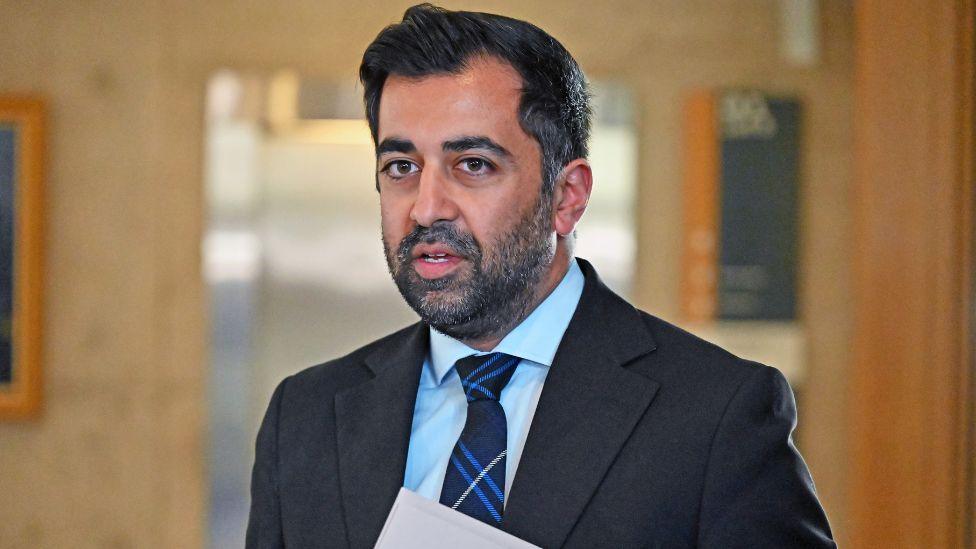Humza Yousaf accused of false claim cover-up
- Published

First Minister Humza Yousaf said he has corrected the record
Humza Yousaf has been urged to refer himself to a parliamentary watchdog after opposition MSPs said he may have knowingly misled parliament.
They suggested civil servants retrospectively created statistics to justify an incorrect statement the first minister made about Scotland's renewable energy capacity.
Mr Yousaf later said he intended to say "per capita" in his original answer.
His spokesperson denied a cover-up and said the record was now accurate.
At First Minister's Questions on 22 June, in a response to Scottish Labour leader Anas Sarwar, Mr Yousaf said that Scotland had "the majority of the renewables and natural resources" in the UK. The correct figure for 2022 was 26%, according to Scottish government figures.
After being challenged by Scottish Tory MSP Liam Kerr, the first minister wrote a letter on 29 August that stated he had intended to say "per capita" in his original answer.
Scottish government emails released under freedom of information (FOI) to pro-Union organisation These Islands show officials established after FMQs on 22 June that Scotland had 26% of UK renewable capacity and 26% of generation in 2022.
But it was not until 3 July that the "per capita" figure appeared in the email chain, much of which was redacted.
The updated figure put Scotland on 651.6GWh per 100,000 people, compared with 649.7GWh for the rest of the UK combined.
In a letter to Mr Yousaf, Scottish Liberal Democrat leader Alex Cole-Hamilton said the emails suggested the figures had been "reverse engineered" to "save embarrassment" for the first minister.
Allow X content?
This article contains content provided by X. We ask for your permission before anything is loaded, as they may be using cookies and other technologies. You may want to read X’s cookie policy, external and privacy policy, external before accepting. To view this content choose ‘accept and continue’.
He urged Mr Yousaf to refer himself to the independent advisers of the Scottish Ministerial Code.
"I am concerned that in the course of correcting the record in relation to the exchange on 22 June that you may have knowingly misled Parliament in your letter of 29 August," he wrote.
Tory MSP Mr Kerr, who has also called for Mr Yousaf to refer himself to the independent advisers, accused the civil service in Scotland of becoming "increasingly politicised" at FMQs on Thursday.
The first minister responded and said that he would not take lessons on "truth and honest from the party that gave us Boris Johnson".
The Scottish government has also rejected the claim.
Mr Yousaf's spokesman told reporters the cover-up claims were untrue.
He said: "The fact that we corrected the record speaks for itself and the fact that we disclosed under FOI the discussions that took place in terms of civil servants surely also speaks for transparency."
The first minister is able to refer matters to the independent advisers to "provide advice on which to base their judgement about any action required in respect of ministerial conduct".


Ministers are expected to tell the truth when they speak in the Holyrood chamber. And if they inadvertently say something inaccurate, they should correct the record.
So when Humza Yousaf wrote his letter explaining he meant to say "per capita" that probably should have been the end of all this.
But some are claiming these civil service emails, obtained under FOI laws, show that the per capita figure didn't exist back in June.
They ask, therefore, how could the first minister have meant to quote it at that time?
Those close to Mr Yousaf say he knew the per capita details were accurate, and that the civil service work was done to help with an official response.
It seems unlikely the first minister will refer himself to the independent advisor on the ministerial code.
This looks like it will stay a political fight. And a slightly complicated one at that.